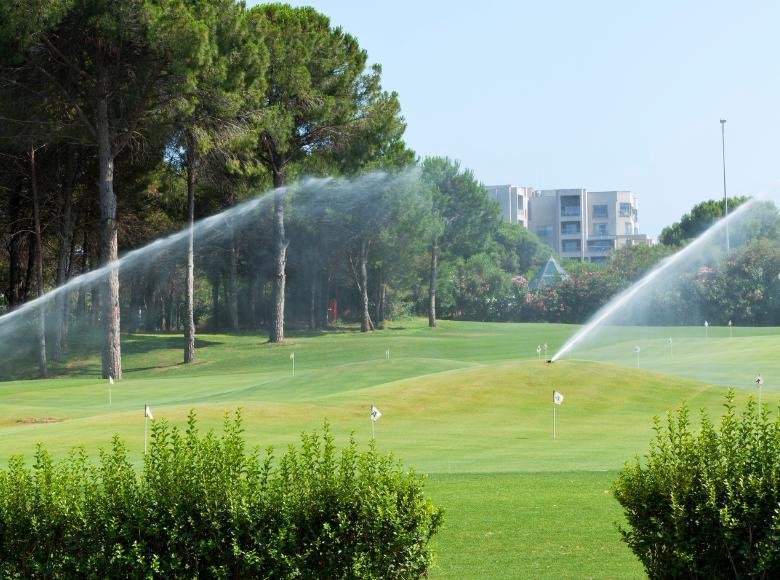Implementing intelligent irrigation technologies, appropriate scheduling, soil moisture monitoring, irrigation auditing, and utilizing drought-tolerant grass varieties, mulching non-playing areas, targeted watering practices, and raising awareness among staff are essential strategies for golf courses in Florida to conserve water during the hot summer months.
As the scorching summer months approach, water conservation becomes imperative, particularly in regions like Florida, where heatwaves and droughts are prevalent. Golf courses, with their expansive landscapes and demanding water requirements, must employ effective strategies to conserve water while upholding the quality of the course. In this blog post, we will explore practical water conservation approaches that golf courses in Florida can implement during the hot summer months.
1. Utilize Intelligent Irrigation Technologies
Investing in intelligent irrigation technologies can significantly reduce water usage on golf courses. Advanced systems with weather-based controllers can adjust watering schedules based on real-time weather conditions, evapotranspiration rates, and soil moisture levels. This ensures that water is applied only when necessary, preventing over-irrigation and reducing waste.
2. Implement Appropriate Irrigation Scheduling
Timing plays a pivotal role in irrigation efficiency. Watering during the early morning or late evening hours helps minimize evaporation losses and allows the turf to effectively absorb moisture. Avoiding irrigation during the hottest parts of the day reduces the risk of water loss due to evaporation. Additionally, adhering to local watering restrictions and guidelines promotes responsible water usage.
3. Consider Soil Moisture Monitoring
Regularly monitoring soil moisture levels provides valuable insights into the water needs of the turf. By employing soil moisture sensors or other monitoring devices, golf course superintendents can accurately determine when irrigation is necessary, avoiding unnecessary watering. This precision in watering ensures that the course receives adequate moisture while avoiding water wastage.
4. Practice Irrigation Auditing

Conducting regular audits of the irrigation system helps identify inefficiencies and areas for improvement. Inspecting sprinkler heads for proper alignment and coverage prevents overspray or watering non-targeted areas such as sidewalks or paved surfaces. Promptly repairing any leaks or damaged components prevents water loss. Optimizing the irrigation system ensures effective water distribution and minimizes waste.
5. Utilize Drought-Tolerant Grass Varieties
Selecting and incorporating drought-tolerant grass species into the golf course’s turf significantly reduces water requirements. Native or adaptive grass varieties that thrive in Florida’s climate and soil conditions require less irrigation. Consulting turfgrass experts can provide insights into suitable grass species that can flourish with minimal water input.
6. Apply Mulch in Non-Playing Areas
Mulching non-playing areas, including landscape beds, trees, and shrubs, helps retain soil moisture and reduce evaporation. Organic mulches like wood chips or bark regulate soil temperature, suppress weed growth, and retain moisture, reducing the need for additional watering. Applying a layer of mulch around plants conserves water and promotes healthy plant growth.
7. Implement Targeted Watering Practices
Dividing the golf course into hydrozones based on water requirements allows for precise irrigation. Grouping plants with similar water needs together enables more efficient watering. For instance, areas with higher water requirements, such as greens and tees, can be irrigated separately from less demanding areas like roughs. This targeted approach minimizes water waste and ensures each zone receives the appropriate amount of water.
8. Raise Awareness and Educate Staff
Creating awareness among golf course staff and players about water conservation practices is essential. Conducting training sessions to educate staff on proper irrigation techniques, water-saving measures, and the importance of water conservation is crucial. Encourage players to adopt practices such as filling divots, repairing ball marks, and using available facilities wisely to minimize water usage.
Water conservation is paramount for golf courses in Florida, particularly during the sweltering summer months. By implementing these water conservation strategies, golf course superintendents can significantly reduce water usage while maintaining the quality and playability of the course.
It is crucial to adopt a holistic approach that incorporates intelligent irrigation technologies, appropriate scheduling, soil moisture monitoring, and other best practices to achieve sustainable water management on golf courses. Let us strive to conserve water and ensure the long-term sustainability of our golf courses and the environment.
Contact the experts at DTE Golf® to transform your golf course into an exquisite and sustainable oasis. Our team of industry professionals possesses the knowledge and experience to address all your golf course needs. Get in touch with us today and take the first step towards creating a truly remarkable golf course.
